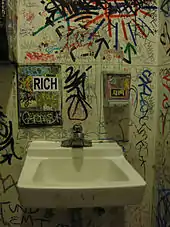Latrinalia
Latrinalia is a type of deliberately inscribed or etched marking made on latrines; that is, bathrooms or lavatory walls.[1][2][3] It can take the form of art, drawings, or words, including poetry and personal reflections. Other types of latrinalia include political commentary and notes on love as well as derogatory (sharing low opinions) comments and pictures. When done without the property owner's consent, it constitutes vandalism. Some venues have attempted to curb such vandalism by installing in the lavatory large blackboards and providing free chalk; it is hoped that patrons will avail themselves of the blackboard and chalk rather than applying their latrinalia directly to the walls or toilet stalls.[4][5]

Study and etymology
An important work in the study of latrinalia is Allen Walker Read's Lexical Evidence from Folk Epigraphy in Western North America: A Glossarial Study of the Low Element in the English Vocabulary. The work describes and collates examples of graffiti observed by Reade on a road trip throughout the Western United States in 1928. It was privately published in Paris in 1935 since its description of bathroom graffiti was considered too racy for American publishers.[6] It was eventually published in the United States in 1977, under the title Classic American Graffiti.[7] The work was described as a classic "model study" of latrinalia that "deserves the attention of any serious student of American language" in a 1979 review, which noted that even then it remained hard to access and "excessively rare."[8]
The late Alan Dundes, a folklorist at University of California, Berkeley, coined the term latrinalia in 1966 to refer to graffiti found in restrooms.[9] Dundes preferred it over the term shithouse poetry, as not all latrinalia is in verse or poetic form.[9]
The word is derived from the compounding of latrine (or toilet) and the suffix -analia, which signifies a worthless collection of something — in this case bathroom writings.
See also
Bibliography
- Joseph Gelfer, The Little Book of Toilet Graffiti
- Jim Morrison, Privy Thoughts: Some Toilet Graffiti Found On University Bathroom Doors
References
- Green, Penelope (3 January 2008). "Anarchy Rules: The Dishes Stay Dirty". The New York Times. Archived from the original on 20 June 2017. Retrieved 13 August 2017.
- Salyers, Christopher D. (2006). CBGB: Decades of Graffiti. ISBN 0977282759.
- "Rock's Scariest Bathroom Immortalized in 'CBGB: The Movie'". Archived from the original on 2017-08-13. Retrieved 2017-08-13.
- Golden Gate [X]Press Online | R.I.P. All Your Base Are Belong To Us
- "Cleaning & Maintenance Management Online :: Brought to you by Grand View Media". Cmmonline.com. 2007-02-01. Archived from the original on 2006-05-22. Retrieved 2012-01-07.
- Read, Allen Walker (1977). "Bibliographical Note". Classic American graffiti : lexical evidence from folk epigraphy in western North America : a glossarial study of the low element in the English vocabulary. Waukesha, Wis.: Maledicta. p. 28. ISBN 0-916500-06-3. OCLC 3523105. Archived from the original on 2022-02-27. Retrieved 2022-02-27.
{{cite book}}: CS1 maint: date and year (link) - Read, Allen Walker (1977). Classic American Graffiti. Waukesha, Wis.: Maledicta. ISBN 0-916500-06-3. OCLC 3523105.
- Brunvand, Jan Harold (1979). "Classic American Graffiti by Allen Walker Read (review)". Rocky Mountain Review of Language and Literature. 33 (4): 217. ISSN 1948-2833.
- Dundes, Alan (1966). "Here I Sit — A Study of American Latrinalia". University of California, Berkeley: Kroeber Anthropological Society Papers. Archived from the original on 2005-11-20.
External links
- From The Bathroom Wall - A blog about bathroom graffiti and other humorous topics OFFLINE 2 Sep 2022
- Latrinalia (e Bathroom Graffiti) — Electronic Bathroom Graffiti uploads from around the world.
- Bathroom Graffiti — Bathroom Graffiti by author and photographer Mark Ferem
- Bathroom Graffiti Project — features and rates hundreds of photos of latrinalia from around the world
- Latrinalia — features galleries of bathroom graffiti
- Raina Williams, Content analysis: Latrinalia, Department of Psychology, University of California, Davis
- Mark Ferem, Latrinalia: "It's all in The Head", 50mm Los Angeles
- Matt Schneider, Stall Wall, an ethnography on latrinalia
- Origins of Bathroom Graffiti Documentary
- The Writing on the Stall